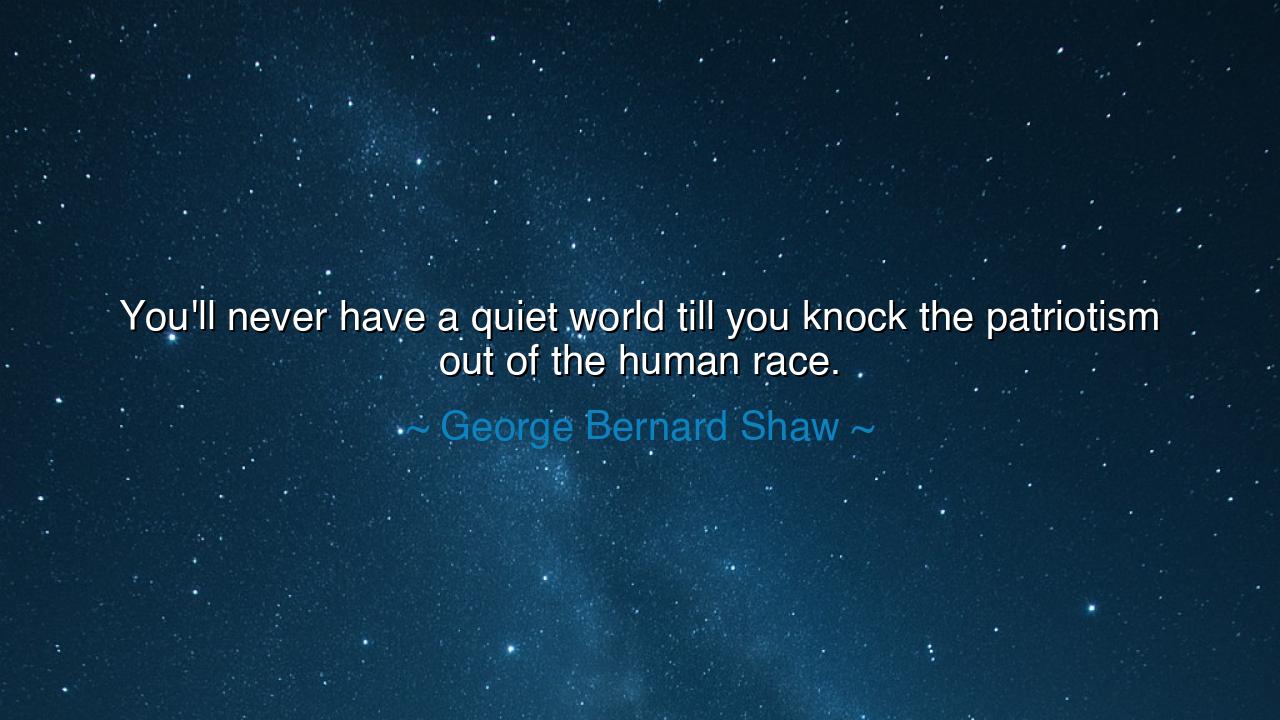
You'll never have a quiet world till you knock the patriotism






Hearken, children of the future, and attend to the provocative words of George Bernard Shaw, who declared that “You'll never have a quiet world till you knock the patriotism out of the human race.” In this stark reflection lies a caution: the very love of country, when untempered by reason, morality, and compassion, can become a force that fuels conflict, division, and war. Shaw reminds us that patriotism, while noble in intent, possesses a double edge—it inspires courage and loyalty, yet it can also ignite aggression and blind obedience, perpetuating discord across nations and generations.
The origin of this reflection emerges from Shaw’s keen observation of human society in the early twentieth century, an era scarred by global conflicts and nationalistic fervor. Witnessing the carnage of wars fueled by fervent devotion to borders, flags, and sovereign pride, Shaw discerned that patriotism, if untethered from virtue and reason, can serve as both inspiration and instrument of destruction. His words challenge us to examine the moral foundations of our allegiance to the nation, and to recognize that loyalty alone does not guarantee peace.
Consider the historical example of World War I, a conflict where patriotism was invoked as a rallying cry across Europe. Citizens and soldiers, inspired by love of country, marched into slaughter, believing in the righteousness of their cause. Borders and sovereignty were defended with courage, yet the human toll was staggering. Shaw’s observation is illuminated here: patriotism, untempered by reflection or empathy, can generate violence and suffering on a massive scale, demonstrating the peril of loyalty divorced from conscience.
Yet Shaw’s insight is not a condemnation of patriotism itself, but a call to temper it with wisdom and virtue. Love of country must be balanced with justice, compassion, and critical discernment. When citizens honor their nation while upholding universal principles, patriotism becomes a force for protection and unity rather than conflict and oppression. The task, therefore, is not to extinguish loyalty, but to cultivate it with ethical awareness, ensuring that the devotion to land and people serves the cause of peace and humanity.
In modern reflection, this lesson resonates in societies grappling with nationalism, xenophobia, and political polarization. Shaw’s warning urges leaders and citizens alike to recognize the dangers of uncritical allegiance, and to nurture a patriotism informed by reason, empathy, and respect for the rights of others. The quiet world he envisions is not achieved through the absence of love for country, but through the cultivation of responsible, enlightened, and morally grounded loyalty.
From this reflection flows a practical lesson: cultivate a thoughtful, ethical patriotism. Love your nation, but question its policies, challenge injustice, and prioritize human welfare above blind allegiance. Recognize that the vigor of the heart must be guided by the principles of justice, empathy, and wisdom. Only through this balance can loyalty inspire courage without perpetuating needless conflict.
Moreover, foster dialogue and education within your communities, teaching that true devotion to the nation includes responsibility, reflection, and respect for others. Encourage critical thinking, civic engagement, and moral courage as the foundation of patriotic action. In doing so, the flames of love for the homeland are channeled toward constructive service, rather than destructive fervor.
Thus, children of tomorrow, inscribe upon your hearts this eternal truth: patriotism, unexamined, can lead to strife, yet guided by virtue and reason, it can sustain honor, courage, and collective well-being. Love your country, but temper devotion with conscience, and let loyalty be expressed in acts that uphold peace, justice, and humanity. In heeding Shaw’s warning, you embrace a form of patriotism that strengthens both the nation and the world it inhabits, ensuring that allegiance serves life rather than destruction.






AAdministratorAdministrator
Welcome, honored guests. Please leave a comment, we will respond soon